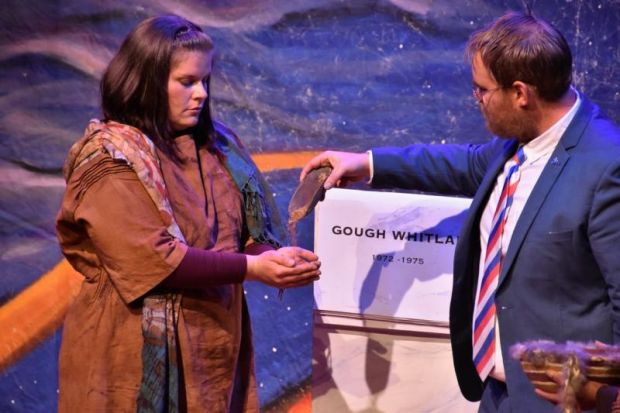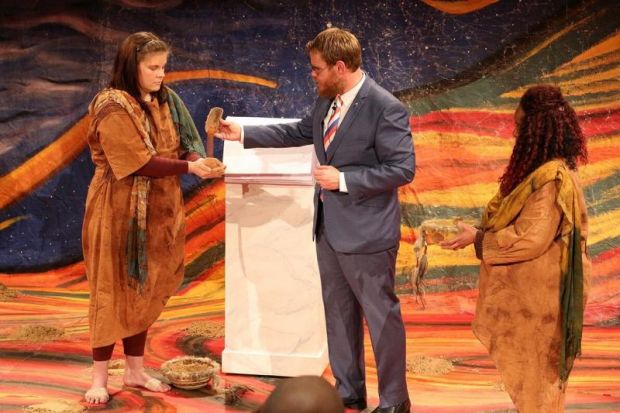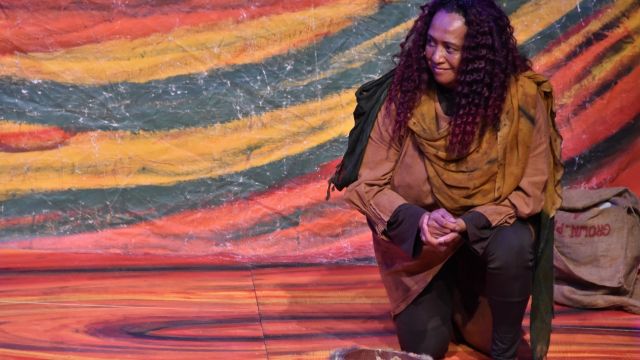Facing Up
Facing up was first performed in Ballarat’s beautiful Botanic Gardens. A feature of those gardens is a series of busts of all our Prime Ministers since Federation. Lynden Nicholls’ text juxtaposes statements made by those Prime Ministers about Australia’s First Nations people with contrasting (and often hidden) pieces of First Nations history. In other words, a mixed bag of white fellas’ good and bad intentions up against what really occurred…
What a contrast that performance provided. The manicured gardens, with trees and plants imported from elsewhere, the rows of Prime Ministerial sculptures and Prime Ministerial words read aloud, all up against the rage, grief, displacement, deracination and endurance of indigenous life narrated by Trudy Fatnowna Edgeley and Zerene Jaadwa.
At Theatre Works, that setting is replaced by an inspired cyclorama of swirling colours and a night sky, with a matching playing area created by Adam (Gus) Powers. Fatnowna Edgeley and Jaadwa, swathed in the colours of earth and Nature, carefully make small heaps of soil all over the stage – as if staking claims on what once was theirs. Later, as they make their historical statements, the two women make hand and footprints in the soil. There is no comment about these gestures, but they are very moving.

Obviously, there are no busts of the Prime Ministers. Shannon Nicholls, in sober business suit and a fittingly colonial beard, drags on a ‘marble’ lectern, scattering or smearing some of the soil piles. The lectern is loaded with small posters showing each Prime Minister’s name, which Nicholls flips over before steadily reading (no impersonations) their pronouncements of legislation, restitution or apology. When this or that Prime Minister said nothing about indigenous people, Nicholls intones, ‘No comment’. He stands resolutely behind the lectern – only coming out to join the women when a Prime Minister has made an attempt at reconciliation, for instance, Whitlam trickling soil into Vincent Lingiari’s hand, or Keating’s Redfern speech.
For some people, most of these pronouncements will be shocking in their confident racism and the enduring colonial mind-set. But they are of their time. Well, not entirely. There is John Howard’s rationale for the ‘Intervention’ as recently as 2007. There is the early assumption that the Aboriginal people will ‘die out’ [anyway]. There are the distinctions between ‘full blood’ and ‘half caste’. There is Menzies’ assurance that no native people would be harmed by the British bomb tests at Maralinga. This last countered by the hard evidence of radioactive clouds, radiation sickness and the pollution of thousands of square miles of central Australia.

Opening nights at Theatre Works usually mean a full house. For Facing Up, the house was maybe a third full. The show has been offered to schools. So far, at least in Victoria, none have accepted. Are the authorities afraid of what the students might hear? Would most – despite the 1967 referendum – prefer to continue what W E H Stanner called ‘the great Australian silence’? Although, in the Q&A that followed the performance, playwright Nicholls told us that schoolchildren in Ballarat sat spellbound at the play’s revelations. As well they might.
Also in the Q&A, AShannon Nicholls was at pains to assert that Facing Up is ‘not political’ but educational. ‘Educational’ certainly, but, no, sorry, it is blatantly, powerfully political. Despite the subtlety of the costumes, the symbolism of the cyclorama, and the beautiful metaphor of the piles of soil and the imprinting on them of hand and footprints, Facing Up is powerful agit-prop. It’s clear what the title means. The play – not really a ’play’ - pits words against actions, speeches against results and you would have to be very obtuse – or ideologically blinkered – not to see the implications and not see them right now as the battle for the Voice goes on.
Michael Brindley
Subscribe to our E-Newsletter, buy our latest print edition or find a Performing Arts book at Book Nook.

